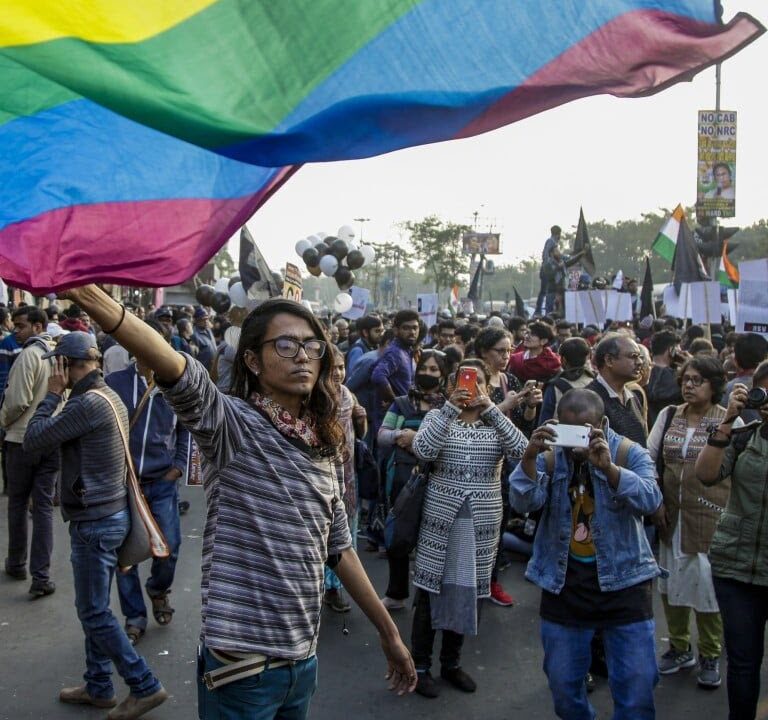В каталоге магазина в Москве представлен большой выбор одежды и снаряжения. [url=http://specodegdaoptom.ru/]магазин спецодежды рядом со мной[/url] Смотрите по ссылке -…

Marriage between a biological man and woman is seen as a sacred union, a sacrament, and a sanskar in India, which is why the Central Government has argued against the legalisation of same-sex marriage before the Supreme Court.
Petitions to officially recognise marriages between people of the same gender are referred to a Constitution Bench of five judges of the Supreme Court by a Bench chaired by the Chief Justice of India.
Where does the government stand on marriage between people of the same gender?
The Indian government contended that the Supreme Court’s decision in Navtej Singh Johar v. Union of India, which was handed down in 2018, only decriminalised sexual intercourse between people of the same sexual orientation and did not legitimise this “behaviour.”
Although the court did remove homosexuality from the list of criminal offences, it did not recognise marriage between people of the same gender as a component of the basic right to life and dignity guaranteed by Article 21 of the Constitution.
The government contends that marriage is contingent on a variety of factors, including traditions, rituals, practises, the cultural ethos, and social norms. A marriage between two people of the same gender is not the same as a marriage between a man and a woman that results in the birth of children.
Only the union of a man and a woman is recognised under the marriage laws in this nation, which were developed and formulated by the country’s Parliament. If marriages between people of the same sexual orientation were to be legally recognised, this would be a breach of both personal and statutory restrictions of the law.
The Special Marriage Act of 1954 established a civil marriage as an alternative for couples whose respective countries did not recognise marriage as a valid legal union. The administration maintained that any change from this standard could only be achieved via the legislative process, and not through the Supreme Court’s decision-making process.
What are the arguments in favour of marrying someone of the same gender?
The law affords everyone the same rights and protections: Everyone, irrespective of the sexual orientation they identify with, has the capacity to wed and have a family if they so want.
It is only fair that same-sex couples be afforded the same legal rights and protections as couples of the opposite sex. The refusal to acknowledge marriages between people of the same gender amounted to a kind of discrimination that went to the heart of the LBTQIA+ community’s efforts to maintain their dignity and realise their potential.
Putting Families and Communities on the Right Track
The social and financial well-being of married couples and their families is improved by the institution of marriage. The practise of marrying within one’s own sexual orientation helps families and communities by fostering a sense of stability and security.
The practise of same-sex marriage is legal in many nations throughout the globe; hence, it is incompatible with universal standards to deny people in democratic societies the opportunity to marry someone of the same gender.
There are 133 nations in which homosexuality is no longer a crime, yet only 32 of those countries allow same-sex marriage.
The following countries have legalised marriages between people of the same gender:
What are the Arguments Against Marriage Between People of the Same Sexual Orientation?
- Beliefs Held by Religious and Cultural Communities A great number of religious and cultural communities hold the position that marriage should take place exclusively between a man and a woman.
- They contend that altering the conventional definition of marriage would be in direct conflict with the underlying foundations that underpin their beliefs and values.
- Some individuals believe that the fundamental goal of marriage is reproduction and that same-sex couples are unable to produce biological children. They also believe that homosexual couples are unable to have biological children.
- As a result of this, they are of the opinion that marriages between people of the same gender should be prohibited since they disrupt the natural order of things.
- Concerns have been raised about the potential for the institution of same-sex marriage to give rise to a variety of legal challenges, including those pertaining to inheritance, taxes, and property rights.
There are many who believe that amending all of the rules and regulations so that they are compatible with same-sex marriage would be an impossible task. The Way Future India is a culturally varied nation with many various religious and social beliefs; hence, the way forward must be culturally sensitive.
The cultural sensitivities of various groups must be taken into account in any legislative or judicial decision on same-sex marriage, but at the same time the basic rights of people must be preserved. Education and Social Acceptance: The LGBTQ+ community has a long way to go before it is socially accepted in India. India also has a long way to go in terms of education.
When education and awareness programmes have been devised to foster acceptance and comprehension of heterosexuality, the topic of same-sex weddings should be brought up for discussion. Duties Under International Law Since India has ratified a number of international human rights treaties and conventions, this country is legally bound to uphold and defend the civil liberties of all people, including members of the LGBTQ+ community.
It is vital that India legalise same-sex marriage in order to guarantee that all persons, regardless of their sexual orientation, are afforded equal rights and opportunities. Several other nations, like as Canada, the United States, and Australia, have already recognised same-sex marriage.